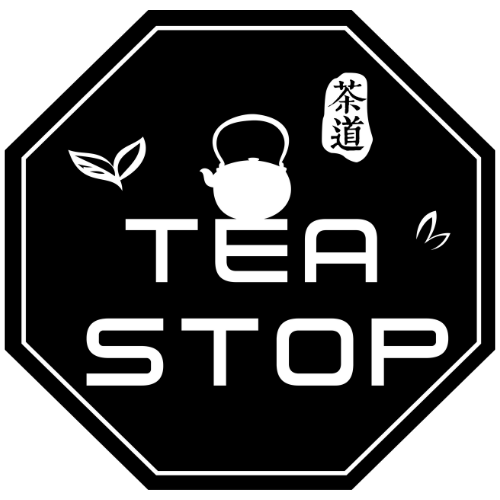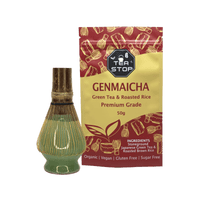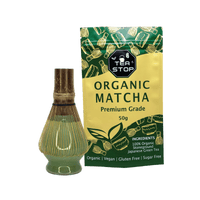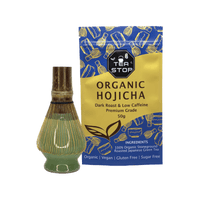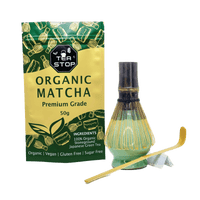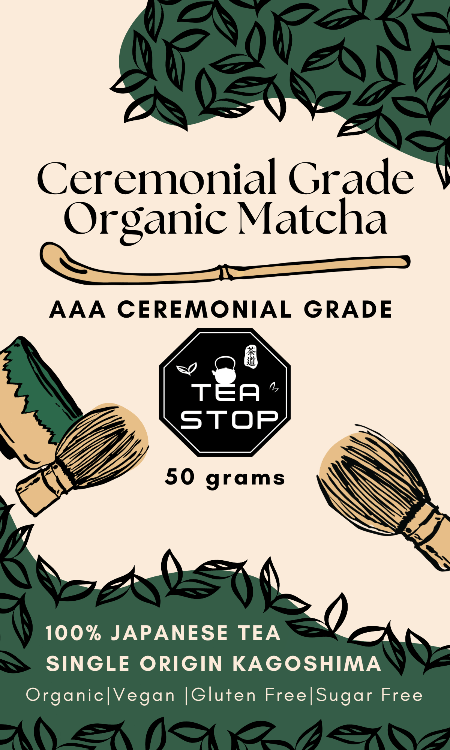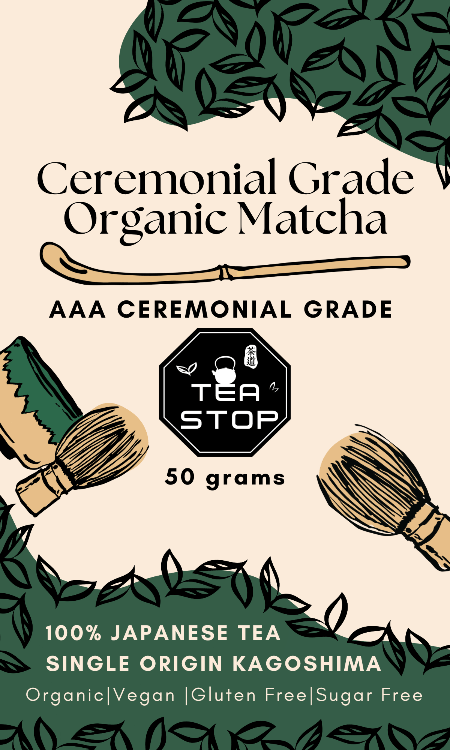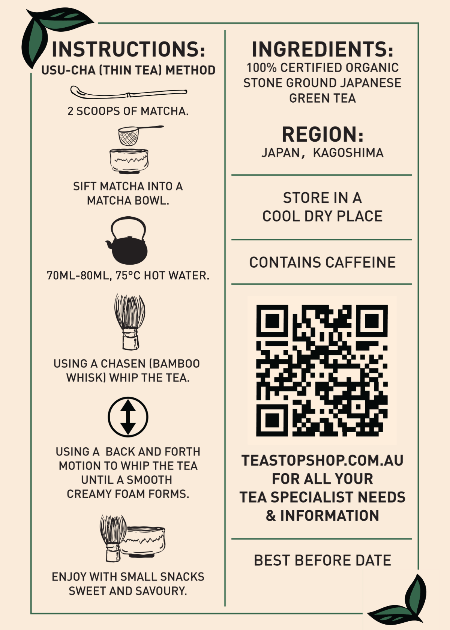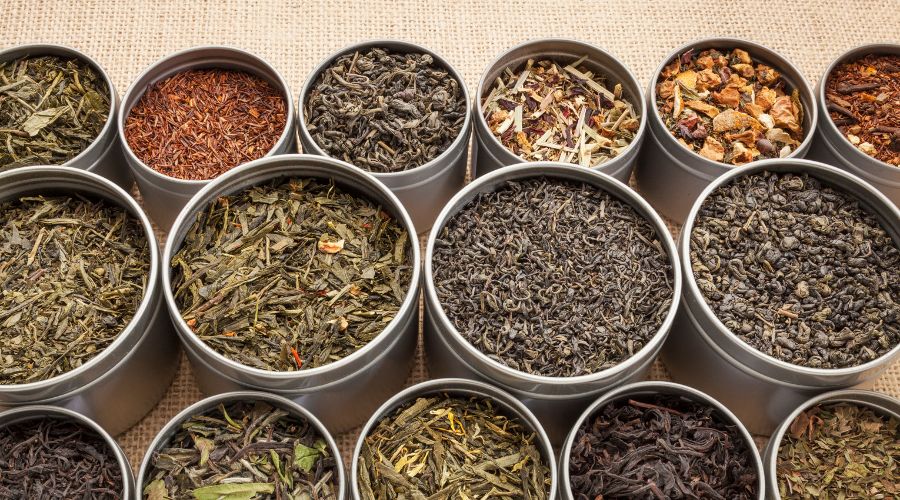
The Environmental Impact of Choosing Organic Loose Leaf Tea
Share
Organic loose-leaf tea is becoming increasingly popular among tea lovers and environmentally conscious consumers. As more people become aware of the environmental impact of their choices, this sustainable option is gaining traction. By using organic farming methods, producers not only create a higher quality beverage but also promote sustainability in tea production.
Choosing organic loose-leaf tea shows a commitment to caring for the environment. Unlike conventional farming methods that deplete natural resources, organic practices improve soil health and support biodiversity without using harmful chemicals. This approach benefits both the planet and the tea itself by enhancing its natural flavors and health benefits.
The message is clear: choosing organic loose-leaf tea is good for your health and the planet. With every sip, you're helping the environment and living a more sustainable lifestyle.

The Environmental Challenges in Conventional Tea Farming
Conventional tea farming, while crucial for meeting global demand, presents significant environmental issues.
Soil Depletion
Soil depletion stands out as a major concern. Intense agricultural practices often strip the soil of essential nutrients, leading to reduced fertility and increased reliance on synthetic fertilizers. This practice not only degrades the land but also affects long-term tea production sustainability.
Water Pollution
Water pollution is another pressing issue linked to conventional methods. The heavy use of chemical pesticides and fertilizers leads to runoff into nearby water bodies, contaminating water sources and harming aquatic ecosystems. These pollutants can disrupt local biodiversity and pose health risks to communities relying on these waters.
Deforestation
Deforestation is often a byproduct of expanding tea plantations. Forests are cleared to make way for new plantations, resulting in habitat loss for countless species and contributing to climate change by reducing carbon sequestration capacities.
Key Players in the Global Tea Market
Major tea-producing countries such as China, India, Kenya, and Sri Lanka play pivotal roles in the global tea market. Their practices significantly influence environmental outcomes. In regions like Assam (India) or Zhejiang (China), intensive farming techniques have led to extensive land-use changes, underscoring the urgent need for sustainable approaches in these critical areas of production.
How Organic Farming Practices Mitigate Environmental Damage
Organic Farming Practices: Definition and Principles
Organic farming is a method of agriculture that emphasizes the use of natural processes and materials to enhance ecological balance and conserve biodiversity. It prohibits synthetic fertilizers, pesticides, and genetically modified organisms, and promotes soil fertility through natural practices. The principles of organic farming revolve around maintaining environmental health, promoting biodiversity, and ensuring sustainability.
Mitigating Environmental Damage
Conventional farming often relies on chemical inputs that can lead to soil degradation, water contamination, and loss of biodiversity. In contrast, organic farming practices focus on sustainable agriculture by minimizing these negative impacts:
- Soil Health: Organic methods prioritize maintaining soil fertility through natural means such as composting and green manures. These practices enhance the soil's organic matter content, improving its structure and ability to retain moisture.
- Water Conservation: By avoiding chemical inputs, organic farming reduces the risk of water pollution. Natural mulching techniques help retain soil moisture, reducing the need for excessive irrigation.
- Biodiversity Support: Organic farms tend to support more diverse ecosystems because they do not use harmful pesticides or herbicides. This allows beneficial organisms—such as pollinators and pest predators—to thrive.
Examples of Organic Farming Methods
- Crop Rotation: This involves growing different types of crops in succession on the same land to improve soil health and reduce pest populations naturally.
- Composting: Incorporating decomposed organic matter into the soil enhances nutrient availability and stimulates microbial activity, which is vital for nutrient cycling.
By adhering to these practices, organic farming not only protects the environment but also fosters a resilient agricultural system capable of supporting future generations.
Water Management in Organic Tea Farming: A Sustainable Approach
In the world of tea cultivation, effective water management is crucial for sustainability. Traditional tea farming methods often lead to excessive water usage and pollution. However, organic tea farming offers a more sustainable solution by optimizing water use and reducing contamination.
The Difference in Water Usage
There is a significant contrast between conventional and organic methods when it comes to water usage:
Conventional Tea Farming
Typically relies on intensive irrigation techniques, which can lead to significant water wastage. Chemical fertilizers and pesticides used in these practices often result in runoff, polluting local waterways.
Organic Tea Farming
Emphasizes natural water management strategies, such as rainwater harvesting and efficient irrigation systems. By avoiding synthetic chemicals, organic practices significantly reduce the risk of water pollution.
Benefits of Organic Practices
Organic practices have a positive impact on both water conservation and pollution control. Here are some ways in which they achieve this:
- Techniques like mulching and composting improve soil moisture retention.
- Enhanced soil structure reduces the need for frequent watering.
- The absence of chemical runoff protects aquatic ecosystems from contamination.
Minimizing Environmental Footprint
By prioritizing sustainable water management, organic tea farming reduces its environmental impact while fostering healthier ecosystems. This dedication to ecological balance highlights the broader environmental advantages of choosing organic loose-leaf tea.
The Advantages of Choosing Loose Leaf Tea Over Packaged Tea Bags
Choosing loose-leaf tea offers significant environmental benefits compared to its packaged counterparts.
1. Reduction in Packaging Waste
One primary advantage is the reduction in packaging waste. Packaged tea bags often come with layers of materials, including plastic, paper, and metal staples, which contribute to landfill waste. In contrast, loose-leaf tea typically requires minimal packaging—often biodegradable or recyclable—thereby supporting waste reduction.
2. Flexibility to Re-Steep Leaves
Additionally, loose-leaf tea provides the flexibility to re-steep leaves for multiple brews. This practice not only maximizes the use of each serving but also further reduces waste. The ability to re-steep is often limited with tea bags due to their smaller size and the quality of the leaves inside.
3. Quality and Freshness
Another consideration is the quality and freshness associated with loose-leaf tea. Because these leaves undergo less processing and are often sourced directly from sustainable farms, they retain their natural oils and flavors better than those in pre-packaged bags. This means a more aromatic and flavorful experience without the need for artificial additives or preservatives.
Ultimately, choosing loose-leaf tea aligns with eco-friendly practices that prioritize sustainability and quality. Embracing this choice supports a more conscientious consumption pattern that benefits both personal well-being and the planet's health.
To fully enjoy the benefits of loose-leaf tea, consider investing in some high-quality teaware or accessories that can enhance your brewing experience. You might also explore different varieties of loose-leaf tea available online or even consider purchasing a tea set for a complete experience.

Promoting Sustainability Through Reusable Infusers and Other Accessories
The shift towards sustainability in tea consumption places a spotlight on the importance of minimizing single-use products. Single-use tea bags and other disposable accessories contribute significantly to environmental waste, as they often contain plastic elements that are not biodegradable.
Reusable infusers offer a practical solution to this problem, allowing tea enthusiasts to enjoy their favorite brews without the environmental guilt. By opting for reusable infusers, you can make a substantial impact on reducing waste, as these accessories are designed to be used repeatedly over time, unlike single-use items.
Benefits of Reusable Infusers:
- Reduces Waste: By eliminating the need for disposable tea bags and packaging.
- Cost-Effective: Saves money in the long run, as they eliminate the need for continually purchasing disposable options.
- Customizable Brewing: Offers greater control over the strength and flavor of your tea by allowing you to adjust leaf quantity easily.
In addition to infusers, other sustainable accessories such as bamboo teaspoons and ceramic mugs further promote eco-friendly practices. These choices align with a broader commitment to sustainability in the tea industry, encouraging consumers to think beyond just the tea itself and consider the environmental impact of their brewing methods.
Sustainable Practices in Tea Cultivation: Beyond Organic Farming
When we look into sustainable practices in tea cultivation, we find many options available that go beyond just organic farming. One such method that shows great promise is agroforestry systems. These systems involve integrating trees and shrubs into tea plantations, resulting in a more vibrant and resilient ecosystem.
Key Benefits of Agroforestry Systems:
- Enhancing Soil Health: The presence of trees and plants in agroforestry systems leads to improved soil quality. Their roots help prevent soil erosion, retain water, and increase organic matter through leaf litter.
- Reducing Ecological Footprint: By incorporating various plant species, agroforestry reduces the reliance on chemical fertilizers and pesticides. This natural collaboration helps maintain a balance within the ecosystem, minimizing its impact on surrounding environments.
- Promoting Biodiversity Conservation: Agroforestry supports diverse habitats, encouraging wildlife preservation. The presence of different plant species attracts various insects and animals, creating an environment conducive to biodiversity.
These sustainable practices greatly benefit organic tea cultivation. By implementing agroforestry systems, tea farmers can strike a harmonious balance between productivity and environmental responsibility. Such systems not only increase yields but also ensure long-term sustainability by safeguarding the land's natural resources.
As consumers become more aware of their environmental impact, it becomes crucial to support tea production methods that prioritize sustainability. This is where innovative practices like agroforestry come into play. By choosing teas grown using these methods, you actively contribute to preserving ecosystems while indulging in your favorite beverage.
Fair Trade Initiatives: Supporting Ethical Labor Practices in Organic Tea Production
In the world of organic loose-leaf tea, Fair Trade Initiatives play a crucial role in ensuring not just environmental sustainability but also social equity. These initiatives are grounded on principles that emphasize fair wages, safe working conditions, and community development. By integrating ethical labor practices into the production process, fair trade ensures that the benefits of eco-friendly practices extend beyond environmental impact to improve the livelihoods of farmers and workers.
Relevance to Organic Loose Leaf Tea Production
Here are some ways Fair Trade Initiatives are relevant to organic loose-leaf tea production:
- Fair Pricing: Fairtrade-certified teas guarantee that producers receive a price that covers their costs of sustainable production. This financial security helps them invest in better farming techniques and infrastructure.
- Safe Working Conditions: Workers in fair trade certified farms benefit from safer working environments and access to essential services such as healthcare and education.
- Empowerment of Farmers: Fair trade cooperatives often reinvest premiums into community projects, fostering empowerment and self-sufficiency among farmers.
Benefits for Farmers and Communities
Choosing fair trade-certified organic loose-leaf tea supports a model that values both people and the planet:
- Social Upliftment: Through fair trade, communities gain access to funds for development projects such as schools, clinics, and clean water facilities.
- Sustainable Development: By promoting eco-friendly practices alongside ethical labor standards, fair trade helps cultivate a more sustainable future for tea-producing regions.
Consumers have the power to make informed choices that align with their values by opting for fair trade-certified organic teas. This not only enhances the quality of life for farmers but also contributes to a healthier ecosystem, reinforcing the interconnectedness of ethical consumption and environmental stewardship.
The Growing Demand for Eco-Friendly Products: Implications for the Organic Loose Leaf Tea Market
As consumer awareness of environmental issues continues to rise, a noticeable shift towards sustainable consumer choices is emerging. People are increasingly seeking eco-friendly products that align with their values of environmental stewardship and sustainability. This trend has significant implications for the organic loose-leaf tea market.
1. Consumer Awareness
Many consumers now prioritize purchasing products that are organic, and sustainably sourced, and contribute to reducing their ecological footprint. This increased awareness has elevated the demand for organic loose-leaf tea, considered a more sustainable option compared to conventional teas.
2. Market Trends
As a result of this shift, the market for organic loose-leaf tea is experiencing substantial growth. Consumers are drawn to the minimal processing involved in producing loose-leaf tea, which often leads to a more authentic flavor profile and less environmental impact due to reduced packaging waste.
The expanding preference for eco-friendly products suggests that businesses specializing in organic loose-leaf tea, such as Australian-based suppliers like Tea Stop Shop, are well-positioned to thrive in this evolving marketplace. By catering to these trends, they not only meet the demands of conscientious consumers but also contribute positively to global sustainability efforts.
Conclusion
Choosing organic loose-leaf tea is more than a personal health choice; it's a commitment to the environmental benefits that come with sustainable tea production. By opting for organic tea, you support farming methods that protect biodiversity, conserve water, and enhance soil health. This decision contributes to a healthier planet and encourages the future of organic tea cultivation.
As consumers become increasingly aware of their ecological footprint, your choice matters. Embrace the change by selecting teas that align with your values and promote sustainability.
Explore our curated selection of premium organic loose-leaf teas from sustainable sources at Tea Stop Shop. Sip consciously and be part of the movement towards a more eco-friendly future with every cup.
FAQs (Frequently Asked Questions)
What is organic loose-leaf tea and why is it becoming popular?
Organic loose-leaf tea refers to tea that is grown without synthetic pesticides or fertilizers, ensuring a more natural product. Its growing popularity is attributed to increasing consumer awareness of health benefits and environmental sustainability.
What are the environmental challenges associated with conventional tea farming?
Conventional tea farming practices often lead to significant environmental issues such as soil depletion, water pollution, and deforestation. Major tea-producing countries like China, India, Kenya, and Sri Lanka contribute to these challenges through unsustainable farming methods.
How do organic farming practices help mitigate environmental damage?
Organic farming practices focus on sustainable agriculture by promoting biodiversity and soil health. Techniques such as crop rotation and composting help maintain ecological balance and reduce the negative impacts associated with conventional farming.
What are the advantages of choosing loose-leaf tea over packaged tea bags?
Loose-leaf tea offers several environmental advantages compared to packaged tea bags, including reduced packaging waste and the ability to re-steep leaves for multiple brews. This minimizes waste and promotes a more sustainable consumption model.
How do reusable infusers contribute to sustainability in tea consumption?
Using reusable infusers helps minimize single-use products in tea consumption, thereby reducing overall waste. By opting for reusable accessories, consumers can significantly lessen their ecological footprint while enjoying their tea.
What role do fair trade initiatives play in organic tea production?
Fairtrade initiatives ensure ethical labor practices within organic loose-leaf tea production. By choosing fair trade certified organic teas, consumers support better wages and working conditions for farmers, contributing positively to their communities.
